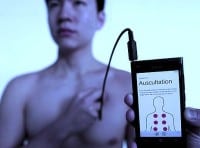
THE SMART FACE OF HEALTHCARE

Virtual hospitals are reinventing medicine
- Dateline
- 14 January 2018
Yessirree, things sure ain’t what they used to be! Just take the new hospital in town…not a patient in sight!
That’s because the new high-tech hospitals don’t have patients. Instead, they have a small but highly-skilled medical team, backed by top-class technicians, and a bewildering array of technology. And they can be anywhere in the world.
The patients are right where they ought to be – at home, or at worst, when serious medical intervention is required, in a nearby specialized clinic for a short stay, before they’re back home again.
The doctors use everything from high-tech remote electronic operating systems and computerized diagnostic machines, to low-tech Skype to meet, interview, diagnose and treat patients. Many medicines can now be ‘printed’ on specialist 3D printers available in every Post Office, or quickly delivered through high-speed local logistics, a huge growth industry.
“We’re able to ‘see’ more patients, and diagnose them accurately, thanks to technology,” says Dr Sheila Deneuve, director of Invisible Hands, the World Health Organization-backed conglomerate that has set up virtual hospitals all over the globe. “And now we are able to offer first-world diagnosis even to poor patients in remote areas.”
Getting actual treatment to such patients remains a challenge, but innovation in the health sector is booming, right down to using unmanned drones to deliver medical supplies to far-flung regions – although dealers in illicit drugs have quickly jumped onto this bandwagon.
“Technology is truly reinventing our profession,” says Dr Deneuve. “The development of the Tricorder in 2016 made basic diagnosis simple and immediate. But the big breakthrough is that specialists can live wherever they want – and still actively treat patients all over the world.”
Links to related stories
- In this lifesaving hospital, there are no patients - SmartPlanet, 22 December 2012
- ‘Robodocs’? ‘Tricorders’? How telemedicine will shape the future of health - Gigaom, 25 January 2013
- Make a phone call to diagnose disease - New Scientist, 07 July 2012
- Qualcomm Tricorder X PRIZE - website
- MindBullet: TAKE TWO ASPIRIN AND WE'LL GOOGLE YOU IN THE MORNING (Dateline: 26 May 2012, Published: 26 June 2008)
- MindBullet: DRUG DRONES SWAMP BORDERS (Dateline: 27 April 2017, Published: 23 February 2012)
Warning: Hazardous thinking at work
Despite appearances to the contrary, Futureworld cannot and does not predict the future. Our Mindbullets scenarios are fictitious and designed purely to explore possible futures, challenge and stimulate strategic thinking. Use these at your own risk. Any reference to actual people, entities or events is entirely allegorical. Copyright Futureworld International Limited. Reproduction or distribution permitted only with recognition of Copyright and the inclusion of this disclaimer.